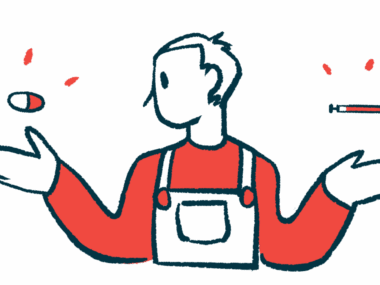A message to the Gaucher community: We are a miracle
A columnist ponders a future where kids will have better options
Written by |

“I am a miracle,” an 8-year-old boy stated matter-of-factly. “We are all miracles. None of us was supposed to have survived this.”
He showed me a chapter written about him in a book about Gaucher disease and read the first page aloud. He was an excellent reader.
I glanced at my own 7-year-old daughter, Violet, wishing she could share the same self-esteem.
We were attending a Gaucher disease workshop for families with young children. Thirteen kids, from infancy to 11 years old, and 12 families had gathered from across the U.S. to connect, learn, and support one another.
Before the workshop, I tried to prepare Violet for what it might feel like to meet other kids with Gaucher — kids just like her.
“What would you say if I asked you about yourself?” I asked during our flight from Anchorage, Alaska, to Washington, D.C.
“I would be shy,” she replied.
“What would you say if you weren’t shy?”
“I am a girl. I live in Alaska. I have a brother and two golden retrievers.”
“And if someone asked what it’s like to live in Alaska?”
“There are lakes and mountains. You can go hiking and fishing,” she said.
“What would you say if someone asked about Gaucher?”
She looked at me and replied firmly: “It’s dumb.”
And that ended the conversation.
At 7, Violet longs to be like her peers. She knows Gaucher holds her back. She can’t move as smoothly as others, tires quickly, takes longer to copy from the board, and gets pulled from class to see speech, occupational, and physical therapists. Last year alone, she had 52 weekly infusions and over 20 doctor appointments. If she gets a fever, we go to the hospital to check her chest port for infection. It’s a lot for a kid.
Every day, my husband and I tell both of our children how wonderful they are. But Violet hasn’t yet internalized how special she is — or how Gaucher is part of that. So I’ve started telling her that she is a miracle — because she is. She’s determined, loving, creative, and funny. She gets frustrated when she struggles, but that’s part of her fierce spirit.
All of our kids are miracles. Violet and her peers have inherited two mutated GBA genes, meaning their bodies lack the enzyme glucocerebrosidase (GCase). Without it, fatty molecules called glucocerebroside build up in cells, causing numerous symptoms. When she was diagnosed at 3 years old, she was very sick. Weekly enzyme replacement therapy (ERT) changed everything.
If she’d been diagnosed before 1991, she wouldn’t have had access to treatment. It simply didn’t exist as an approved drug back then.
But ERT has a major limitation: It doesn’t cross the blood-brain barrier to reach the central nervous system. So while her body improves, her brain does not benefit.
Violet’s generation is helping test new treatments, including gene therapies, that do cross the blood-brain barrier. Their legacy will be a future where newly diagnosed kids will have better options. By living fully and bravely, they are changing the course of rare disease research, proving to doctors and policymakers just how vital investment in treatment is.
That’s a miracle.
This victory matters. Our children may get sicker than their classmates. Caregivers may miss more workdays than their co-workers. Doctors who take on rare disease cases may face more insurance fights.
Violet isn’t wrong — Gaucher is dumb. But we have each other. We are part of the solution, shaping a future where tomorrow is better, even if today is hard.
Note: Gaucher Disease News is strictly a news and information website about the disease. It does not provide medical advice, diagnosis, or treatment. This content is not intended to be a substitute for professional medical advice, diagnosis, or treatment. Always seek the advice of your physician or other qualified health provider with any questions you may have regarding a medical condition. Never disregard professional medical advice or delay in seeking it because of something you have read on this website. The opinions expressed in this column are not those of Gaucher Disease News or its parent company, Bionews, and are intended to spark discussion about issues pertaining to Gaucher disease.




